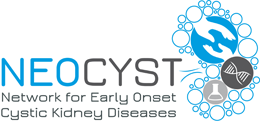NEOCYST (Network for Early Onset CYSTic Kidney Disease) is a multicenter, multidisciplinary network for research on early onset cystic kidney disease. Its primary goal is to improve life of affected patients and their families by increasing the knowledge on the epidemiology, the phenotypical spectrum, the underlying genetic and pathophysiological mechanisms as well as the individual prognosis of early onset cystic kidney diseases and thereby to improve the clinical management and counselling of affected patients.
The project was initiated by a consortium of multiple pediatric centers with a special expertise on cystic kidney diseases featuring pediatric nephrologists, geneticists, basic scientists and informaticians.
NEOCYST is financed by the GermanFederal Ministry forEducation and Research (Bundesministerium für Bildung und Forschung, BMBF) and is supported by the German Society of Pediatric Nephrology (GPN).
The NEOCYST Register study (P2)
The NEOCYST clinical register study represents the core feature of the NEOCYST project. Clinical as well as genetic data are collected in a combined retro- as well as prospective manner on order to gain long-term information on the individual clinical courses of different early onset cystic kidney diseases. The NEOCYST registry for the first time offers the opportunity to collect data on different diseases in one common registry and thereby insures a direct comparability of the following cystic kidney diseases:
- Autosomal Recessive Polycystic Kidney Disease (ARPKD)
- Nephronophthisis and related Ciliopathies (NPH-RC)
- Bardet-Biedl-Syndrome (BBS)
- HNF1ß-Nephropathy (HNF1ß)
This approach increases the quantity as well as the quality of clinical data which in the long-run enable scientists and clinicians to draw more reliable conclusions.
Genetic and molecular characterization:
Apart from a clinical characterization of early onset cystic kidney diseases, the exploration of underlying pathophysiological mechanisms is an essential part of the NEOCYST network and is based on following approaches:
Genetics (P3):
The exploration of new genes as well as the assessment of potential genetic modifier effects will be an essential part of the NEOCYST project using modern sequencing techniques such as NGS panel analyses and Whole Exome Sequencing.
Molecular characterization (P5)
Although in the recent years major progress has been made in the understanding of underlying pathogenic mechanisms, the detailed pathophysiology of cystic kidney disease still remains obscure. Within the NEOCYST project biological material of affected patients will be analyzed to obtain more detailed insights into the following topics:
- structural an functional characterization of respiratory ciliated cell of patients with early onset cystic kidney diseases
- analysis of intracellular signaling pathways
- evaluation of cell adhesion and cell polarity
- in vitro simulation of cystogenesis
Identification of disease specific marker proteins (P6)
By applying urinomics technology to urine samples of affected patients, we try to identify disease specific marker proteins that allow a more accurate prediction of individual disease courses using a non-invasive method.
Biobank (P7)
Biological samples of affected patients are precious for research but due to the limited number of patients their availability is restricted. In order to allow the investigation of multiple scientific questions, a standardized handling, processing and long-term storage of biological material is indispensable. The “Hannover Unified Biobank” provides the facilities for a standardized long-term storage of biological samples that will form the basis for current and future scientific initiatives. Furthermore the Hannover Unified Biobank ensures not only high quality storage conditions but also reliable data security by a certified process of pseudomysation.
Standard of Care Guidelines (P4)
Based on the data gained from the data of the NEOCYST consortium, standardized diagnostic and therapeutic guidelines will be developed in order to provide a standardized and consistent management for affected patients and their families.
